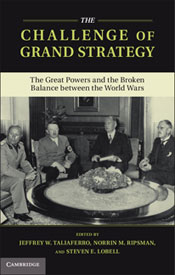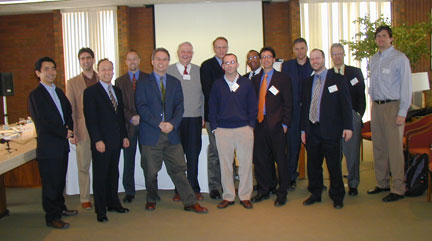Conference

In March 2009, Professor of Political Science Steven Lobell and four Political Science Ph.D students - Saban Kardas, Mark Bean, Koji Haraguchi, and Bill Pingree - hosted a conference on the Grand Strategy in the Interwar Years. The conference brought together junior and senior international relations scholars and diplomatic historians from North America and England to the campus of the University of Utah for two days of paper presentations, discussions, and deliberation. As part of the program, Professor Jack Levy, the Board of Governors’ Professor of Political Science at Rutgers University presented The Ambassador John and Marcia Price Lecture on “Preventive War in Theory and Practice.”
For the organizers, the years between the world wars (the 1920s and 1930s) represent an era of broken balances: the retreat of the United States from global geopolitics, the weakening of Great Britain and France, Russian isolation following the 1917 Bolshevik Revolution, the resurgence of German power in Europe, and the rise of Japan in East Asia. All these factors complicated great-power politics.
In August 2012, based on the conference proceedings, Cambridge University Press published The Challenge of Grand Strategy: The Great Powers and the Broken Balance Between the World Wars, co-edited by Steven E. Lobell, Norrin M. Ripsman, and Jeffrey W. Taliaferro. In revisiting the conventional wisdom on the grand strategies pursued by the great powers between the world wars, the editors and contributors drew on theoretical innovations and new primary sources. The book suggests that the great powers pursued policies that, while in retrospect suboptimal, represented conscious, rational attempts to secure their national interests under conditions of extreme uncertainty and intense domestic and international political, economic, and strategic constraints.
In revisiting the interwar period, the authors emphasize the valuable lessons for contemporary international affairs. In the past several years there has been a resurgence of interest in the phenomena of preventive war, appeasement, diplomacy, collective security, arms control and disarmament, and economic nationalism.
The conference and book would not have been possible without the support of the College of Social and Behavioral Sciences, Office of the Vice President for Undergraduate Studies, Ambassador John and Marcia Price Foundation, Office of International Education Programs, Department of Political Science, Institute for Public and International Affairs, The Graduate School, Political Science Graduate Student Advisory Committee, and the Associated Students of the University of Utah.

Participants
Back Row (LT to RT): Saban Kardas, Scott Silverstone, Bill Pingree, Mark Bean, Jeffrey Taliaferro, Peter Jackson, Jack Levy, Pat McDonald
Front Row (LT to RT): Koji Haraguchi, Tsuyoshi Kawasaki, Dale Copeland, Tim Crawford, Steven Lobell, Norrin Ripsman
Grand Strategy in
the Interwar Years
University of Utah
Salt Lake City
March 26-27, 2009
Agenda
Thursday, March 26
10:00 (Burbridge Room, Alumni House)
Welcome and Opening Remarks
Steven Ott, University of Utah
Steven Lobell, University of Utah
10:30-12:00 (Burbridge Room, Alumni House)
Panel I: Europe and the 1920s
a. "Globalization and the Sustainability of the Post-World War I Settlement"
Pat McDonald, University of Texas-Austin
b. "From Treaty Enforcement to Multi-lateral System-Building: Rethinking the evolution
of French security policy in the 1920s"
Peter Jackson, University of Wales, Aberystwyth
c. "The Legacy of Peace-Building: The Constraining Impact of the Locarno Order on Grand
Strategy in the 1930s"
Scott Silverstone, United States Military Academy at West Point
Discussant: Scott Cooper, Brigham Young University
Chair: Ben Judkins, University of Utah
1:45-3:00 (Hinckley Caucus Room, OSH 255)
Ambassador John and Marcia Price Lecture
"Preventive War in Theory and Practice"
Jack Levy, Rutgers University
Board of Governors' Professor of Political Science at Rutgers University, and Senior
Associate at the Saltzman Institute of War and Peace Studies at Columbia University.
He is past president of the International Studies Association (2007-08) and of the
Peace Science Society (2005-06).He has previously held tenured positions at the University of Texas at Austin and
the University of Minnesota, and visiting or adjunct positions at Tulane, Stanford,
Harvard, Yale, Columbia, and NYU. Professor Levy received APSA's Helen Dwight Reid
Award (1977) for the best dissertation in International Relations in 1975-76, and the Distinguished Scholar Award from the Foreign Policy Analysis Section of
the International Studies Association (2000). His research focuses primarily on the
causes of war, foreign policy decision-making, and qualitative methodology.
Alumni House, University of Utah
155 South Central Campus Drive
Salt Lake City, UT 84112
Phone: (801) 581-6995
Fax: (801) 581-3711
3:30-5:00 (Burbidge Room, Alumni House)
Panel II. Europe in the 1930s
a. "Threat Perception and the British Response to Nazi Germany, 1933-1936"
Norrin Ripsman, Concordia University and
Jack Levy, Rutgers University
b. "Economic Appeasement or Realpolitik? Britain's Trade Concessions to Germany during
the 1930s"
Steven Lobell, University of Utah
c. "The Origins of Expansionist Grand Strategies: A Comparison of Germany and Japan
in the Interwar Years"
Dale Copeland, University of Virginia
d. "Interdependence: Can it Stop History from Repeating Itself?"
Mark Bean, University of Utah
Discussant: Adam Luedtke, University of Utah
Chair: Paul Hammond, Emeritus,
University of Pittsburgh
Friday, March 27
8:00 - 9:30 (Burbidge Room, Alumni House)
Panel III. Global Politics and the 1930s
a. “Strategy of Innocence or Calculated Provocation? Neoclassical Realism and the Roosevelt
Administration’s Road to World War II, 1938-41”
Jeffrey Taliaferro, Tufts University
b. “Powers of Division: From the Anti-Comintern, to the Nazi-Soviet, to the Japanese-Soviet
Neutrality Pact”
Tim Crawford, Boston College
c. “Realism in Disguise: Termination of the Anglo-Japanese Alliance and the Washington
Conference”
Koji Haraguchi, University of Utah
d. “The Rising Sun Was No Jackal: Japan, the Axis Pact, and Alliance Formation Theory”
Tsuyoshi Kawasaki, Simon Fraser University
Discussants: Valerie Hudson, Brigham Young University,
Christopher Whytock, University of Utah
Chair: Howard Lehman, University of Utah
9:45- 11:00 (Burbidge Room, Alumni House)
Roundtable: Reflections on Yesterday, Today, and Tomorrow
Christopher Layne, Texas A&M University
Grand Strategy in the Interwar Years
University of Utah
Salt Lake City
March 26-27, 2009
In 1939, E. H. Carr published his book, The Twenty Years’ Crisis, 1919-1939 about the interwar period, and the “glaring and dangerous defect of nearly all thinking
about international politics.” In the past several years, there has been a resurgence
of interest in the phenomena of preventive war, appeasement, diplomacy, collective
security, arms control and disarmament, trade and interdependence, and the political
economy of grand strategy.
The overarching goal of the Grand Strategy in the Interwar Years conference is to
revisit the interwar period, comparing the permissive environment of the 1920s to
the less permissive environment of the 1930s. This comparison will allow us to draw
valuable lessons for contemporary international affairs.
The conference will bring together junior and senior international relations scholars
and diplomatic historians, as well as University of Utah graduate students. Presentations
will reexamine the 1920s and the 1930s, and the grand strategies of Germany, Great
Britain, France, the Soviet Union, Japan, and the United States
ORGANIZATION COMMITTEE
Saban Kardas
Mark Bean
Bill Pingree
Koji Haraguchi
ACADEMIC ADVISOR
Steven Lobell
CONTRIBUTORS
College of Social and Behavioral Sciences
Office of Vice President for Undergraduate Studies
Ambassador John and Marcia Price Foundation
Department of Political Science
Institute for Public and International Affairs
Graduate School
Political Science Graduate Student AdvisoryCommittee
Associated Students of the University of Utah
Foreign Policy Studies Club
